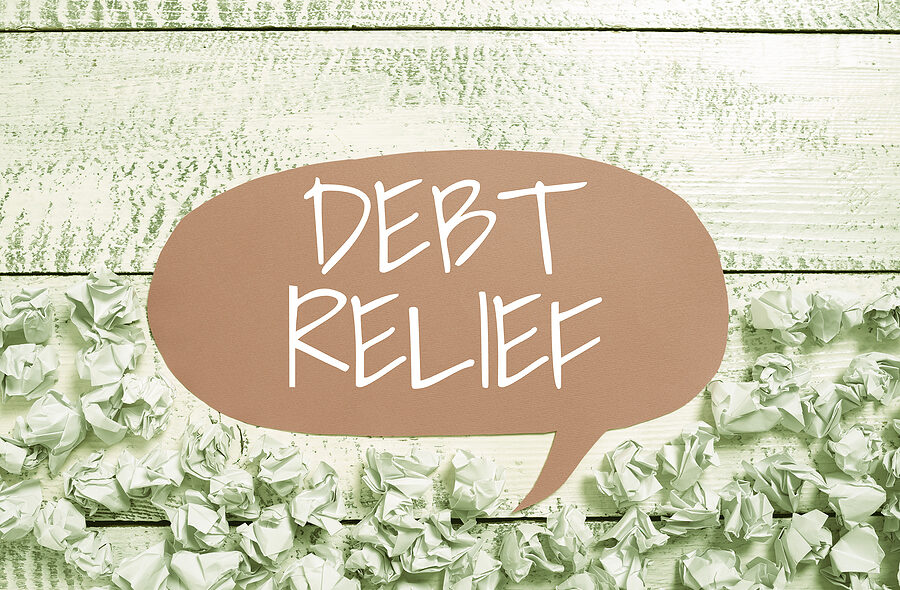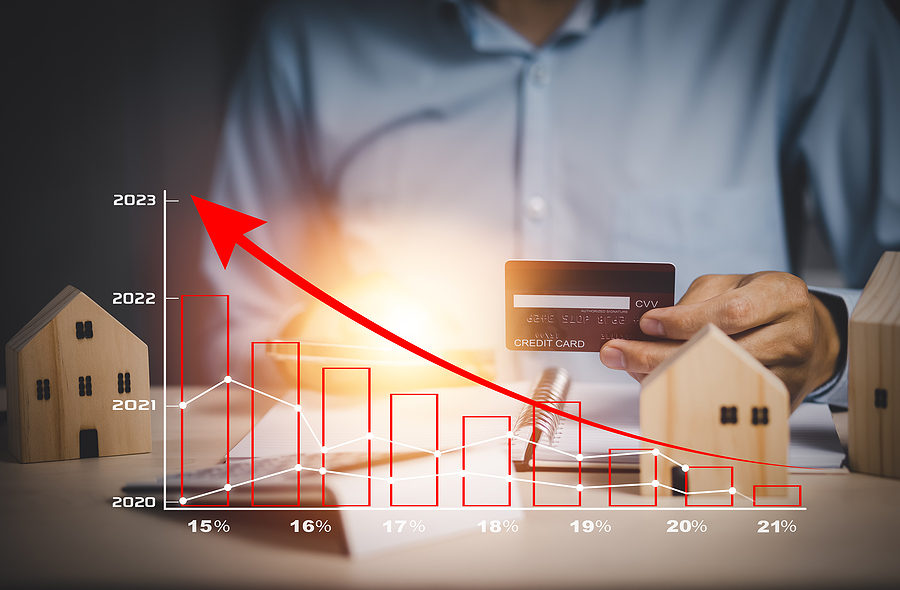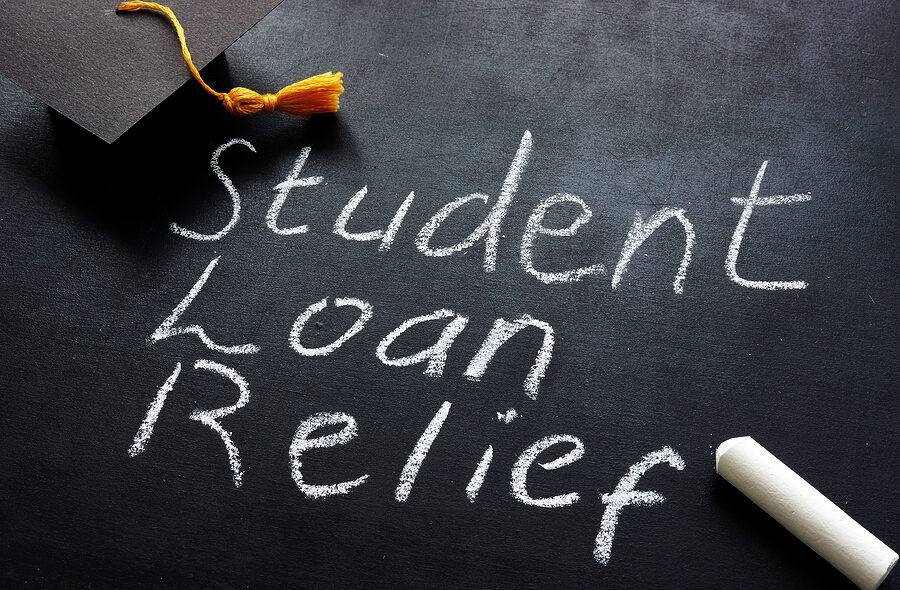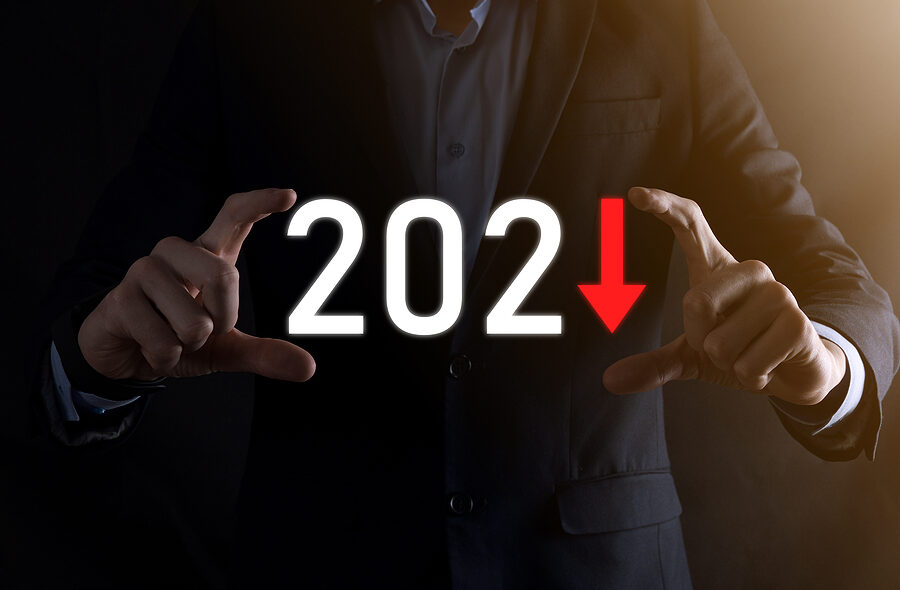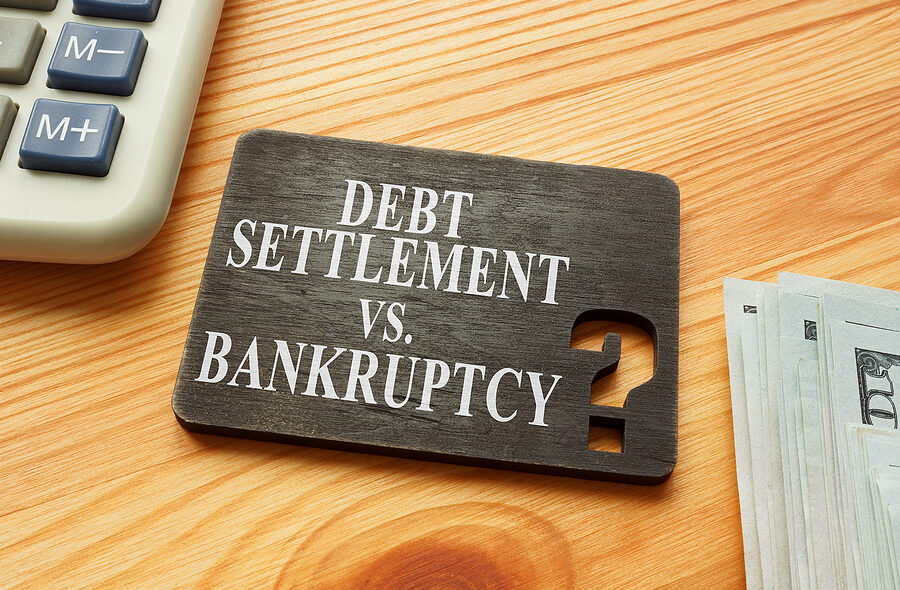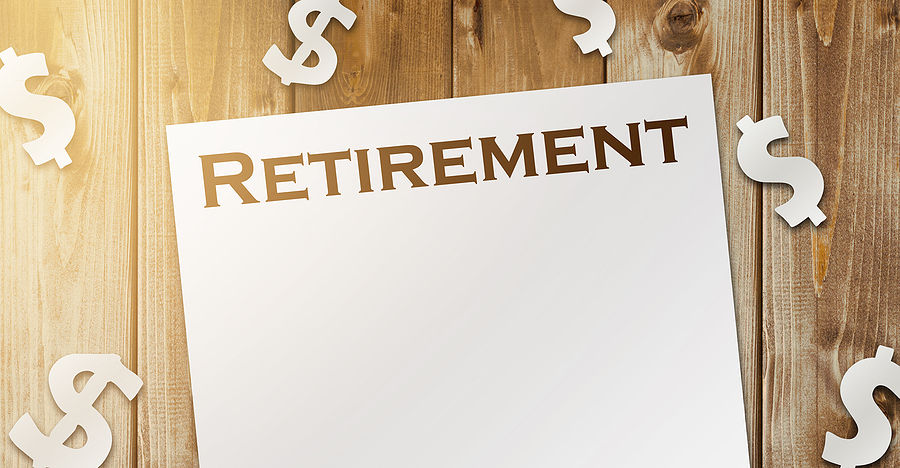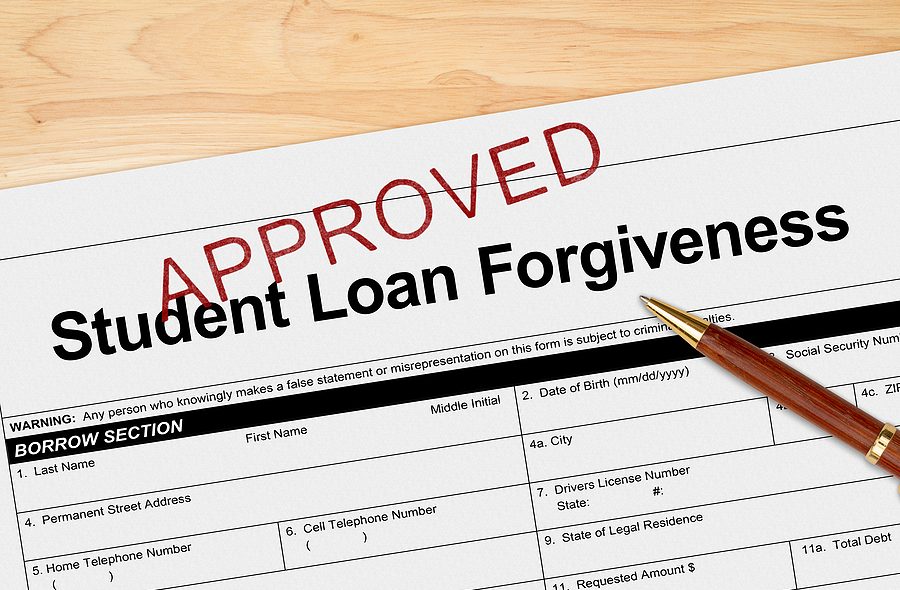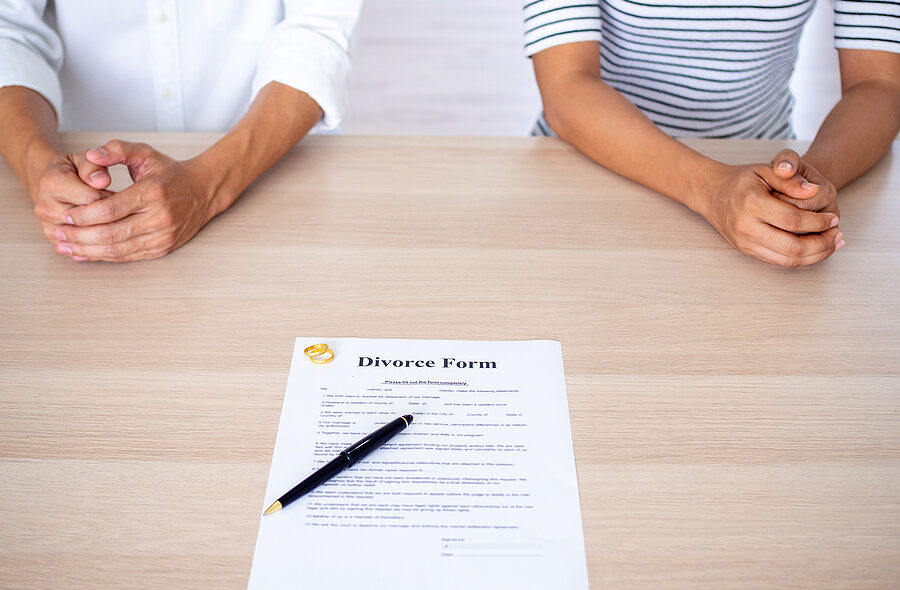Many consumers handle their finances under the assumption that carrying a balance from month-to-month on their credit card(s) will give their credit score a boost. This common misconception will not only keep the consumer with a credit card balance, but it also may not do anything beneficial for their credit score.
Tag: debt relief
Understanding the Difference Between Bankruptcy and Debt Consolidation
When dealing with debt, there are different options consumers have available to them in terms of eliminating that debt. When it comes to debt consolidation and bankruptcy, it’s important to understand the differences between these two approaches, as well as the pros and cons of each.
Over 40 Percent of Consumers Plan to Take on More Debt Despite Rising Interest Rates
Approximately 43 percent of American consumers say they intend to accrue more debt in the next six months. This is despite interest rates increasing, making the cost of borrowing more expensive. This information comes from a recent study published by LendingTree.
LendingTree surveyed more than 1,000 individuals regarding their spending habits. They found that 61 percent of them already carry some level of debt. Approximately 80 percent of consumer debt is linked to expenses that are considered necessary, such as healthcare expenses or other emergencies.
Recent Study Reveals the Burden Debt Has on Mental Health
Carrying any amount of debt can be stressful, but carrying substantial amounts of debt can be debilitating to a consumer’s emotional well-being. Debt can cause anxiety and depression, and the longer a person carries it, the more likely he or she will feel physical and emotional effects from it. A recent study highlighted just how severe the effects of insurmountable debt can be.
The data reviewed comes from the 2021 BC Consumer Debt Study released by BC Licensed Insolvency Trustees Sands & Associates. They surveyed over 1,700 consumers throughout British Columbia who declared personal bankruptcy or legally consolidated a debt.
The survey noted two specific trends regarding consumer debt. The largest proportion, approximately 32 percent, of people who responded to the survey said that they had had $25,000 to $49,999 of debt, not including mortgages or car loans.
Four out of five surveyed said they found that the main causes of their debt were completely outside of their control. For example, 18 percent reported that their debt grew to the amount it was due to them needing to rely on credit to pay for essential costs of living that their income could not cover. Additionally, others reported that their debt was caused by other issues outside of their control, such as illness or health-related problems, the breakdown of a marriage or relationship, and job-related issues.
Of the consumers surveyed, more than 56 percent of them said that credit card debt was their largest source of debt before they entered formal proceedings to eliminate their debts. Payday loans were the main source of debt for approximately six percent of those polled.
Individuals surveyed reported that being in such deep debt negatively affected their well-being. In terms of emotional well-being, 77 percent said their mental health suffered. Four out of five individuals said they constantly worried about being in debt. Three in four surveyed said debt caused them anxiety.
Even more concerning, one in six individuals surveyed said that the stress of carrying large amounts of debt resulted in them contemplating or thinking of suicide.
Mental health was not the only thing affected by debt. Fifty-three percent said that their physical health likewise suffered.
One major issue occurs when the consumer is not truly aware of how much he or she actually owes, resulting in the individual’s finances spiraling out of control. The stress that results from this debt can be debilitating to the person’s mental well-being. Approximately 68 percent reported that they concluded that debt was a major problem when it became a source of major stress in their lives. Sixty percent (60%) said they realized debt was a problem when they could only make minimum payments, while fifty percent (50%) said they realized debt was a major problem when their balances never went down from month to month. Unfortunately, at that point, their debt had grown to a figure that they could not control, forcing them into either bankruptcy or other sources of debt relief.
For more information, the full study can be accessed here.
If you have questions on this topic or are in financial crisis and considering filing for bankruptcy, contact an experienced Miami bankruptcy attorney who can advise you of all of your options. As an experienced CPA as well as a proven bankruptcy lawyer, Timothy Kingcade knows how to help clients take full advantage of the bankruptcy laws to protect their assets and get successful results. Since 1996 Kingcade Garcia McMaken has been helping people from all walks of life build a better tomorrow. Our attorneys’ help thousands of people every year take advantage of their rights under bankruptcy protection to restart, rebuild and recover. The day you hire our firm, we will contact your creditors to stop the harassment. You can also find useful consumer information on the Kingcade Garcia McMaken website at www.miamibankruptcy.com.
Navient Student Loan Settlement Focuses on Delinquent Borrowers
A settlement has been reached as of January 13, 2022, involving student loan servicing company, Navient, and approximately 400,000 student loan borrowers. This settlement provides some much-needed debt relief to hundreds of thousands of delinquent borrowers.
The lawsuit alleges that Navient encouraged student loan borrowers who were behind on their loan payments to enter into costly long-term forbearance programs that kept them in debt. Additionally, borrowers alleged that Navient likewise encouraged them to take on private loans which the borrowers were not able to pay back. To hold the loan servicing company accountable, lawsuits were filed by several states and were joined by 39 attorneys general.
The settlement specifically focuses on student borrowers who took out loans to attend for-profit colleges between the years 2002 and 2014. In the settlement, Navient said they will cancel $1.7 billion in private student loan debt for approximately 66,000 borrowers. In addition, they said they would pay $95 million in restitution for 350,000 federal student loan borrowers.
The goal of this settlement and the reason behind the lawsuit is to prevent predatory lending practices is accused of doing to borrowers. The lawsuit claimed that Navient encouraged borrowers who were not able to make their loan payments to enter forbearance programs instead of income-drive repayment plans. While forbearance programs do help borrowers in a temporary bind, they end up being much costlier in the long run and can often push the borrower even deeper into debt. Investigations into Navient practices found that employees in the call center were pushed to recommend borrowers go into forbearance programs instead of recommending programs that would be much better for the borrower’s financial situation.
Another predatory practice found through investigations into Navient’s practices involved pushing borrowers to apply for subprime private student loans even knowing that the borrowers had low credit and a high likelihood that they would not be able to repay the private loans. Most students who took out these private loans were attending for-profit institutions. However, under federal law, school tuition payments must be at least 90 percent federally funded, therefore making the schools more dependent on federal funding instead of private.
Navient adamantly denied the claims in the lawsuit. They stated the settlement was entered into to avoid financial burden and time in litigation.
Borrowers who are eligible for debt cancellation under the settlement include those who took out private subprime student loans between 2002 and 2014. These loans were mostly taken out through Navient’s predecessor, Sallie Mae. Loan cancellation is available for borrowers who were behind on their private loan payments for at least seven consecutive months prior to June 30, 2021. If a borrower was current on his or her loan obligations, that person would not be eligible for cancellation.
In addition, borrowers who received a non-subprime private student loan to attend a for-profit educational institution listed specifically in the settlement, including DeVry University and University of Phoenix, are also eligible for debt cancellation.
Debt cancellation will be available for borrowers from 38 states and the Washington D. C., who took out federal loans through Navient and were in forbearance for at least two years between 2009 and 2017.
Please click here to read more.
For borrowers who are struggling with student loan debt, relief options are available. Many student loan borrowers are unaware that they have rights and repayment options available to them, such as postponement of loan payments, reduction of payments or even a complete discharge of the debt. There are ways to file for bankruptcy with student loan debt. It is important you contact an experienced Miami bankruptcy attorney who can advise you of all your options. As an experienced CPA as well as a proven bankruptcy lawyer, Timothy Kingcade knows how to help clients take full advantage of the bankruptcy laws to protect their assets and get successful results. Since 1996 Kingcade Garcia McMaken has been helping people from all walks of life build a better tomorrow. Our attorneys help thousands of people every year take advantage of their rights under bankruptcy protection to restart, rebuild and recover. The day you hire our firm, we will contact your creditors to stop the harassment. You can also find useful consumer information on the Kingcade Garcia McMaken website at www.miamibankruptcy.com.
While Bankruptcy Filings Were Down in 2021, Financial Challenges Await for 2022
Even with the ongoing COVID-19 pandemic, the number of bankruptcies filed in 2021 were down from previous years. However, financial experts fear that these lower numbers will not continue as the COVID-19 pandemic continues into 2022.
According to numbers from the federal court system, a combined total of 434,540 bankruptcy filings were made by both individual consumers and businesses through September in 2021. This figure is 30 percent lower than it was from a similar report issued previously for 2020 bankruptcy filings. According to the federal court system, 612,561 bankruptcy cases were reported for that same period in 2020 and 766,674 cases were filed in 2019 for this same period.
While it is possible that a similar trend could be seen in 2022, it is unlikely. One reason for this decrease in bankruptcy filings could be the number of increased government benefits issued in 2021, including a third round of stimulus checks, monthly child tax credit payments, and additional jobless benefits issued by the government.
Many other benefits have ended as of the end of 2021, including the eviction and foreclosure moratoriums that were keeping financially struggling consumers in their homes. Without additional aid, these individuals may have no other choice but to seek bankruptcy for relief. With no future relief efforts expected in terms of stimulus checks and monthly child tax credit payments, consumers who relied on this safety measure in 2021 to stay afloat may soon find themselves struggling. The last enhanced child tax credit was issued as of December 15, 2021, with no future plans for additional credits in the near future. Certain relief efforts are being continued, including the pause on federal student loan payments. This pause has been extended through May 1, 2022.
Traditionally, it can take a consumer up to two years of struggling financially before making the decision to file for bankruptcy. Often, this decision occurs when the person’s hand is forced through something like an eviction or foreclosure notice. However, given the fact that many consumers have been barely getting by to avoid filing for bankruptcy, that timeline may escalate somewhat once relief programs expire.
The additional factor of inflation has made the situation for many consumers worse. Many consumers have resorted to using credit cards and loans to pay for living expenses. According to the Federal Reserve Bank of New York, credit card and student loan debt rose by $61 billion to a whopping $4.25 trillion in the third quarter of 2021.
A combination of all of these factors could result in a worsening financial picture in 2022, but it remains to be seen just how much of an effect these will have on the number of bankruptcies filed in 2022.
Please click here to read more.
If you have questions on this topic or are in financial crisis and considering filing for bankruptcy, contact an experienced Miami bankruptcy attorney who can advise you of all of your options. As an experienced CPA as well as a proven bankruptcy lawyer, Timothy Kingcade knows how to help clients take full advantage of the bankruptcy laws to protect their assets and get successful results. Since 1996 Kingcade Garcia McMaken has been helping people from all walks of life build a better tomorrow. Our attorneys’ help thousands of people every year take advantage of their rights under bankruptcy protection to restart, rebuild and recover. The day you hire our firm, we will contact your creditors to stop the harassment. You can also find useful consumer information on the Kingcade Garcia McMaken website at www.miamibankruptcy.com.
Should I Hire a Debt Relief Agency to Avoid Bankruptcy?
Consumers often resort to seeking the assistance of a debt relief company in an effort to avoid filing bankruptcy. However, hiring a third-party debt relief company is not always a wise decision for the consumer if bankruptcy is inevitable.
Some consumers decide to retain the services of a debt settlement company to negotiate payments on their outstanding debts. However, often the better option ends up being either having the consumer directly settle his or her debts without hiring another company or having the consumer move forward with filing for bankruptcy.
Debt settlement companies say they can work directly with the consumer’s creditors to settle their outstanding unsecured debts. In order to accomplish this, most debt settlement companies tell their clients to stop making payments on their debts, thereby pushing the debts into collections. The debt settlement company will then tell the consumer to pay them a monthly fee, which will be set aside into a savings account for future settlement of the person’s debts.
Unfortunately, there are many things a debt settlement company fails to tell the consumer when they are hired to negotiate the consumer’s debts. Ultimately, debt settlement is a business, and the company is looking out for their bottom line, not the consumer’s best interest, which is why so many debt relief scams exist.
First, while the debt settlement company is working on the consumer’s behalf, the total amount of debt will continue to grow thanks to interest accruing and fees being assessed when the consumer stops making payments. The consumer will also find his or her credit score taking a significant hit during this time since defaulting on a financial obligation is reflected poorly on someone’s credit report. Additionally, the creditor is under no obligation to work with the debt settlement company. They may be successful in settling a debt, the creditor is not obligated to take a settlement offer just because one is made. The creditor is always within their rights to pursue the full amount owed.
The consumer’s credit score will definitely be impacted by debt settlement. Essentially, entering debt settlement is an admission of the consumer not paying his or her debts as originally agreed. Additionally, the debt settlement will stay on the consumer’s credit report for seven years.
Ironically, debt settlement can also leave the consumer in an even worse situation than when he or she started, especially if the efforts to negotiate the debts are unsuccessful. For many consumers, going through debt settlement is essentially delaying the inevitable filing for bankruptcy. It is usually best for the consumer to first sit down with a bankruptcy attorney and analyze his or her situation to see which route is the best one to take.
Please click here and here to read more.
If you have questions on this topic or are in financial crisis and considering filing for bankruptcy, contact an experienced Miami bankruptcy attorney who can advise you of all of your options. As an experienced CPA as well as a proven bankruptcy lawyer, Timothy Kingcade knows how to help clients take full advantage of the bankruptcy laws to protect their assets and get successful results. Since 1996 Kingcade Garcia McMaken has been helping people from all walks of life build a better tomorrow. Our attorneys’ help thousands of people every year take advantage of their rights under bankruptcy protection to restart, rebuild and recover. The day you hire our firm, we will contact your creditors to stop the harassment. You can also find useful consumer information on the Kingcade Garcia McMaken website at www.miamibankruptcy.com.
How Your Credit Card Debt Can Hurt Your Retirement Savings
Credit card debt presents a challenge for many Americans. This type of debt comes with higher interest rates and lack any potential tax benefits. Credit card debt should essentially ‘retire’ before you do, because it can eat into your savings and reduce your standard of living.
While paying down debt is important, saving for retirement should not be overlooked. Many times, consumers want to focus all their efforts on paying down outstanding debts, saying that they will start saving for retirement once they conquer their debts. By doing this, however, the consumer misses out on the returns that could be made on any money invested in his or her 20s and 30s. For example, if the consumer begins saving $200 a month, starting at age 20, he or she would likely have around $550,000 to $600,000 saved at an annual return rate of 6.5 percent. If he or she waited until he or she was 25 to save, that person would only end up with $435,000 at retirement.
The problem with credit card debt is the high interest rates, which can make paying a large balance off extremely difficult. Often, consumers will only end up paying the minimum amount owed from month-to-month, which only covers the interest that accrued from the prior month. This method not only prolongs paying off the credit card, but it also delays being able to set aside any money for savings for the future. For someone with a credit card balance of $6,300, carrying an interest rate of 17 percent, paying the minimum payments alone could mean it will take the individual 18 years to fully pay off the card.
The key is to learn how to do a combination of both, saving for retirement and putting enough money towards paying down debts. Not all consumers are able to pay balances off in full, but they should at least make more than the minimum monthly amount owed. Any additional amount will help towards paying down the principal. At the same time, any amount the consumer is able to put away towards retirement savings helps, even if the amount seems small. Savings of any amount is better than the alternative of not saving at all. As more and more debts are paid off, the consumer can take what he or she was using towards outstanding debt and put that amount towards retirement savings. Any amount of progress is better than no progress at all.
How are retirement accounts protected in bankruptcy?
The Federal Bankruptcy Code and Florida bankruptcy exemptions extend protection to various types of individual retirement accounts (IRAs) during a bankruptcy. This protection was solidified in 2005 with President George W. Bush signing the Bankruptcy Abuse Prevention and Consumer Protection Act (BAPCPA) into law.
Traditional IRAs and Roth IRAs are protected up to $1 million in value. The precise amount protected is currently $1,362,800. Adjustments are made every three years for inflation with the next one anticipated in 2022. The BAPCPA also states that bankruptcy courts have the discretion to extend additional protection to cover more than the amount allowed under the exemption.
Please click here to read more.
If you have questions on this topic or are in financial crisis and considering filing for bankruptcy, contact an experienced Miami bankruptcy attorney who can advise you of all of your options. As an experienced CPA as well as a proven bankruptcy lawyer, Timothy Kingcade knows how to help clients take full advantage of the bankruptcy laws to protect their assets and get successful results. Since 1996 Kingcade Garcia McMaken has been helping people from all walks of life build a better tomorrow. Our attorneys’ help thousands of people every year take advantage of their rights under bankruptcy protection to restart, rebuild and recover. The day you hire our firm, we will contact your creditors to stop the harassment. You can also find useful consumer information on the Kingcade Garcia McMaken website at www.miamibankruptcy.com.
First Wave of Public Servants Awarded Student Loan Forgiveness Through Temporary Program
The Biden administration recently announced the introduction of a temporary expansion of the Public Service Loan Forgiveness program. The program cancels outstanding student debt for public servants.
In order to be eligible, debt holders must have made 120 payments toward their federal student debt on-time for at least 10 years. The loans must have been made through the federal government and payments must have been made through repayment plans, most of which are based upon income. They must also work for the government or one of the non-profit organizations specified by the program. Many teachers, public defenders, Peace Corps workers, and law enforcement officers may qualify for forgiveness.
How Debt is Handled in Divorce
In a divorce, the married parties end up dividing assets accumulated during their marriage. Most people going through a divorce worry about dividing up their property and other assets. However, dividing up debt is just as important- if not more. This is of particular importance if the spouses do not have many assets.
A divorce judgment is where the court divides up the couple’s assets, as well as their debts. Part of this order involves determining which spouse is responsible for which debts. Normally, debts are divided equally between the parties, but that is not always the case when one spouse earns significantly more than the other or where one spouse is receiving more property that has debt connected to it than the other spouse.


